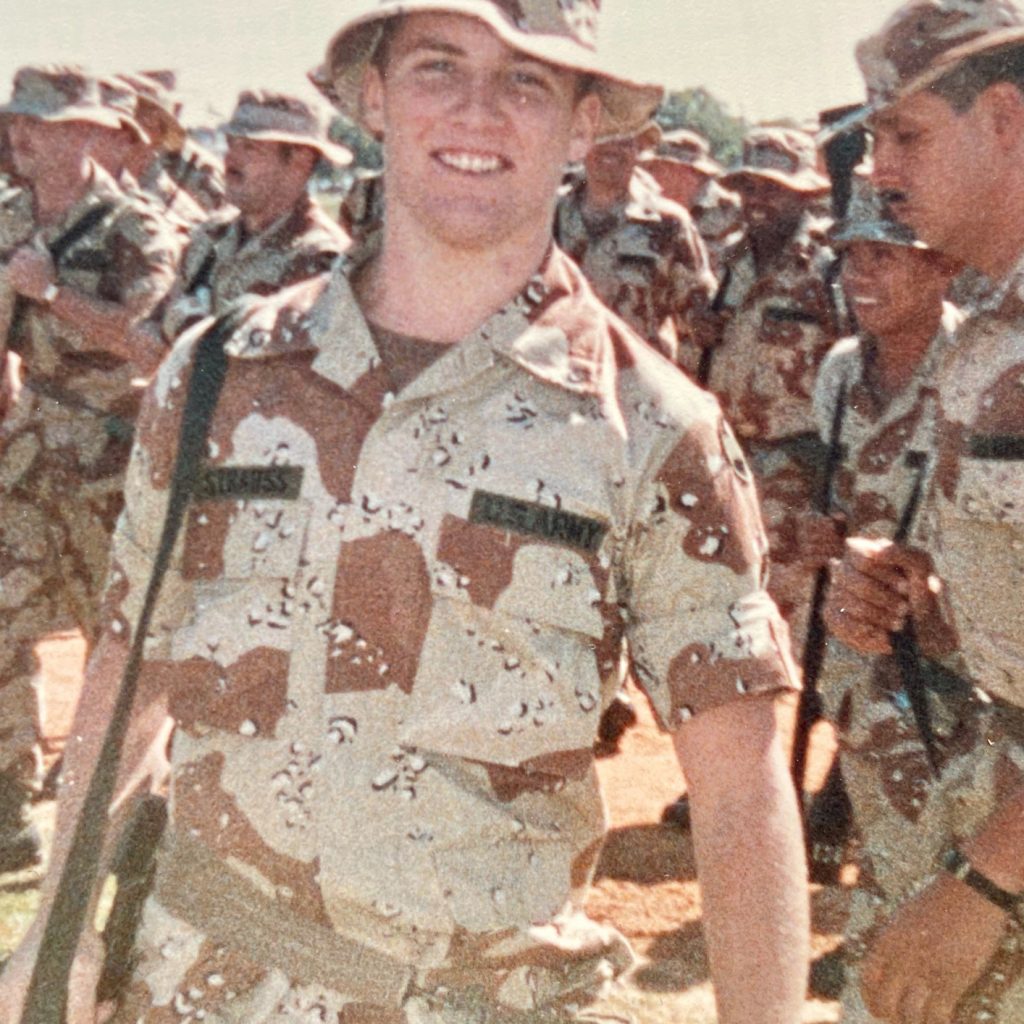The Persian Gulf War, code named Operation Desert Storm, earned the nickname of “the video game war” because for the first time, people in America were able to watch an entire military campaign unfold in real time on their television sets.
For one North Augusta man, Desert Storm was anything but a video game. It was a real war with real bullets.
Mike Strauss was a 19-year-old, bright eyed lad when he joined the U.S. Army in 1990. A native of Deposit, N.Y., a tiny village near Binghamton (current population 1,712), Strauss was only a child when America’s last major military engagement, the Vietnam War, ended.
When Strauss enlisted, the Cold War with the USSR was winding down, and he said he expected that he would be serving in relative peacetime. That would change when Saddam Hussein’s Iraqi troops invaded neighboring Kuwait and threatened to overrun Saudi Arabia.
Strauss quite literally went from boot camp at Fort Gordon to arriving in a war zone in the middle of a desert in a country that he would have been hard pressed to find on a map.
[adrotate banner=”51″]
“It was scary, I’m not gonna lie to you. When you start hearing the bombs drop, and you start seeing that stuff, and you know it’s real, you sleep with one eye open,” Strauss said.
Originally, Strauss was sent to Saudi Arabia as part of Operation Desert Shield before joining the invasion forces to liberate Kuwait. Strauss’ unit was tasked with building runways and helipads in the midst of a war zone. His unit also dug graves.
“We dug a lot of graves in anticipation that there would be heavy casualties,” Strauss said.
MORE: Veterans Day Salute: Bob Young
According to Strauss, battle fatigue set in quickly as the constant bombardment of shells made it impossible to sleep, and the threat of unexploded ordnance kept him in a constant state of high alert.

When Desert Storm began in January 1991, Americans at home were awed by the spectacle of tracer fire lighting up the night sky in Baghdad and watched on as Wolf Blitzer of CNN reported from the scene of what appeared to be a dazzling fireworks display.
Even President George H. W. Bush admitted he was getting just as much information from CNN as he was from his own generals. For most Americans, the Persian Gulf War was the precursor to today’s prime time reality shows.
Only it was a reality show featuring real live death and destruction.
The stakes were much higher than the average American knew at the time. Iraqi Dictator Saddam Hussein made every attempt to fracture the 35-nation coalition by sending SCUD missiles exploding into Israel as part of what he called “the mother of all battles.”
As was true so many other times throughout history, the relatively small skirmish between a few small nations had the potential to domino into a much larger conflict or perhaps even a world war, according to military historian Hubert van Tuyll.
MORE: Veterans Day Salute: Gail Erlitz
Strauss says that he and his fellow servicemen knew what they were up against and were determined to do their jobs representing American might to force Iraq into submission and prevent a larger scale conflict.
“The infrastructure over there is not anything like what you see in America. What they consider a highway looks more like a backroad residential street here, and we had to travel those roads in the dark because we didn’t want to give away our position and we never knew what was in front of us,” Strauss said.
[adrotate banner=”20″]
Speaking of highways, rumors and even news reports at the time accused the coalition forces of mowing down retreating Iraqi forces on what was called the “highway of death.” Some commenters at the time called it a “turkey shoot.”
Strauss says that never happened.
“I was there. I saw those oil fields on fire with my own eyes. The Iraqis were abandoning their vehicles and waving their underwear in the air. They were so cut off from their supplies that their hair was all matted down, and there was sand in their beards, they were hungry…it was pitiful,” Strauss said.
After his experience in the Persian Gulf War, Strauss decided to settle in North Augusta, not far from where he was stationed at Fort Gordon instead of going back to his native New York.
“People still call me a Yankee, but that’s okay,” he said.
Scott Hudson is the Senior Reporter for The Augusta Press. Reach him at scott@theaugustapress.com












